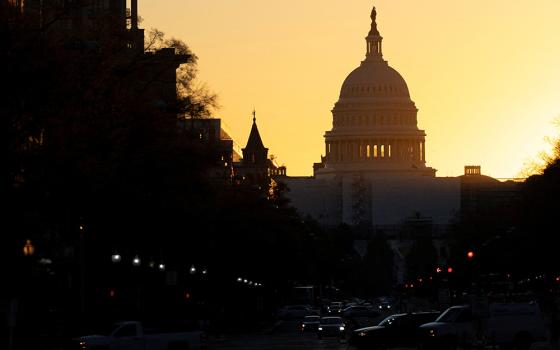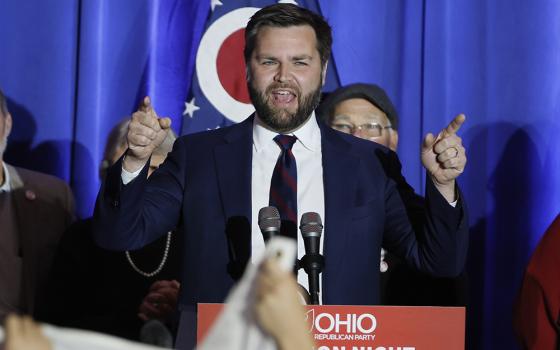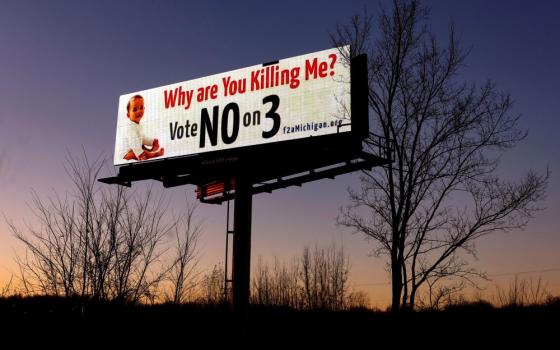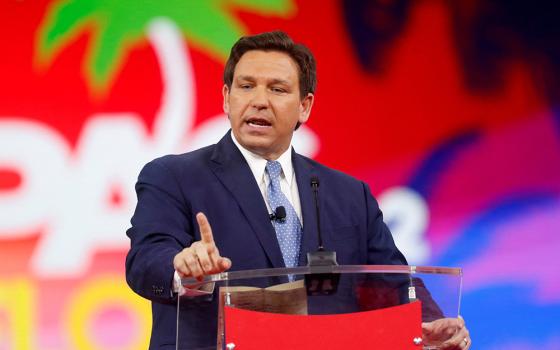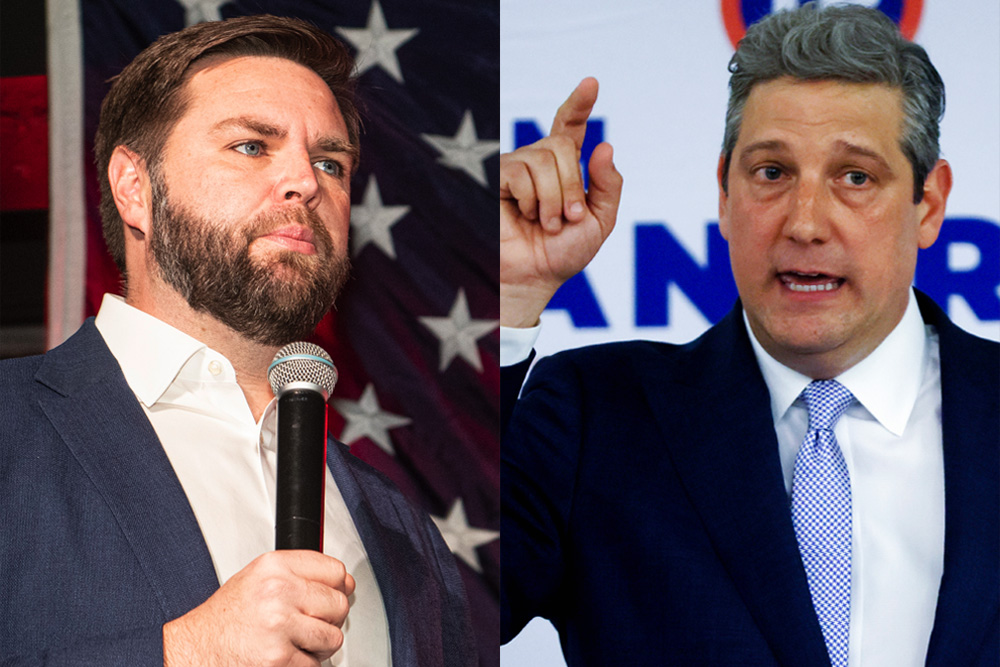
Left: J.D. Vance, Republican candidate for U.S. senator in Ohio, speaks at a campaign event in Medina, Ohio, Oct. 21 (AP/Phil Long). Right: Rep. Tim Ryan, D-Ohio, running for the open U.S. Senate seat in Ohio, speaks May 3 in Columbus (AP/Jay LaPrete).
Wearing blue jeans, a white button-down shirt and a navy-blue sport coat, U.S. Senate candidate J.D. Vance on Oct. 8 walked up to the microphone at Franciscan University of Steubenville, his fourth event that day on the campaign trail.
Vance swung by the conservative Catholic university in eastern Ohio to deliver a keynote speech that would cap a two-day national conservatism conference, where several speakers described their hopes for a United States governed by a right-wing regime that would use political power to rein in globalization, restore traditional Christian morality and bolster social conservatism while sidelining "woke" progressives.
Vance, a Republican running as a populist in his first campaign for public office in Ohio, commended the conference for boasting "an incredible smorgasbord of intellectuals." He later warned attendees to not give in to despair amid a historical era that he described as "pretty fraught and pretty difficult but pretty exciting."
"We are so worried about what's going to happen tomorrow that we lose faith, I think, in the fact that we serve an awesome God and he is in control, and he always has been and he always will be," said Vance, a Catholic convert, former U.S. Marine and venture capitalist who grew up in Appalachia and gained fame for his 2016 best-selling memoir, Hillbilly Elegy.
As a Catholic political candidate who associates with "post-liberal" and far-right personalities, Vance provides a stark contrast to his Democratic opponent, Ohio Congressman Tim Ryan, who is also Catholic but a conventional politician not looking to challenge the tenets of the global postwar economic and political order.
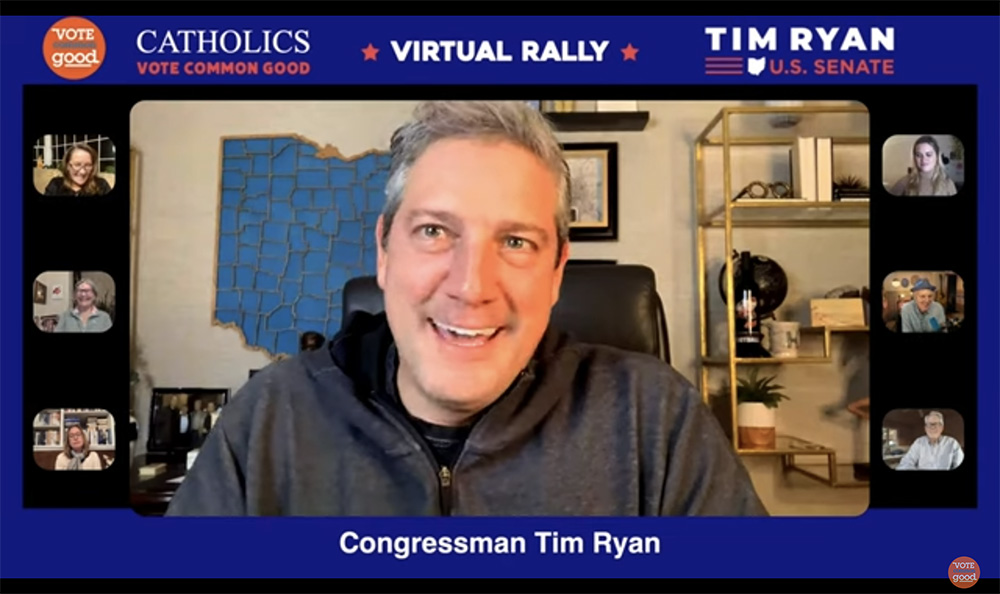
Rep. Tim Ryan, D-Ohio, speaks during an Oct. 2 virtual rally hosted by Catholics Vote Common Good. (NCR screenshot/YouTube/Vote Common Good)
"We have to be united against the extremists. ... Democracy is a decision that we have to make," Ryan said during an Oct. 2 virtual rally hosted by Catholics Vote Common Good, a progressive group.
During the rally, Ryan credited his 13 years of Catholic schools, the examples of his devout grandfather, other churchgoing relatives, social-justice-minded religious sisters and Pope Francis' emphasis on solidarity as being major influences in his public life.
"I'm on the Pope Francis Twitter feed and I make sure I'm always staying connected to what he's saying on public issues," Ryan said.
A neck-and-neck race
Vance and Ryan differ in how they talk about their Catholic faith and how it informs their campaign platforms. The race has been neck-and-neck for weeks and will be decided on Nov. 8. The outcome may not only determine what party controls the U.S. Senate, but which candidate's style of Catholicity becomes politically ascendant in an increasingly polarized country where the future of democracy itself could be at stake.
"There are some periods in our history where there's just an era of tumult, where things change, the deck gets reshuffled, and new hands are dealt. It sort of feels that right now — ideologically, culturally, socially, politically and religiously — there's just an awful lot of shuffling happening," said Mark Caleb Smith, director of the Center for Political Studies at Cedarville University in Cedarville, Ohio.
Smith told NCR that Ryan — who has represented Youngstown and its suburbs since he was a 29-year-old freshman member of congress in 2003 — strikes him as a "more traditionally Catholic" politician who is willing to "swim in traditional political waters" and who is "certainly not a critic of the root of the American system of government."
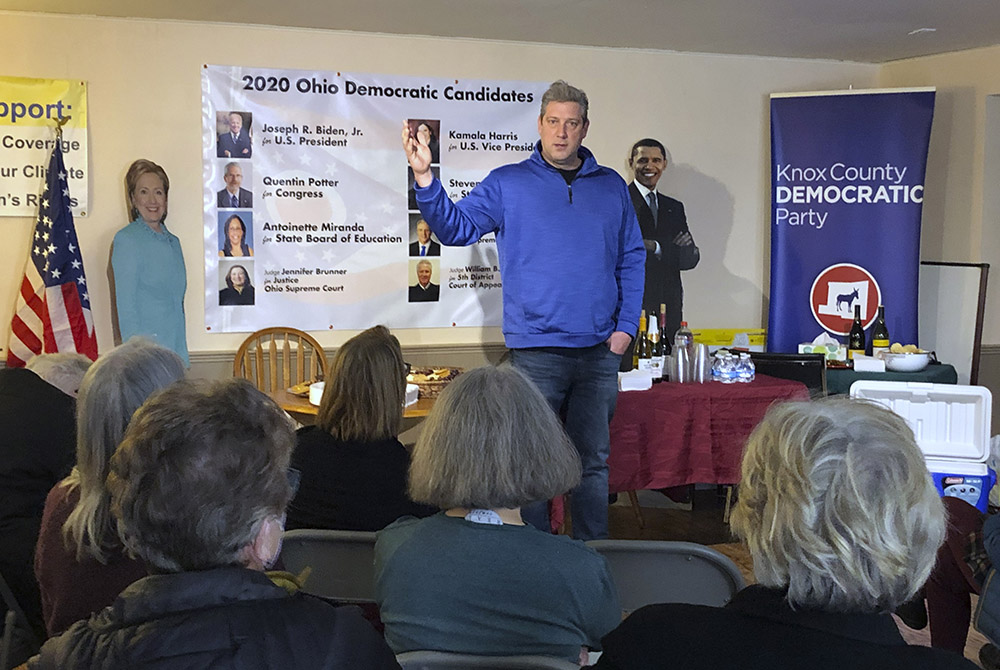
Ohio Rep. Tim Ryan speaks at a campaign event at the Knox County Democratic Party office in Mount Vernon, Ohio, on March 10. (AP/Jill Colvin)
Jesuit Fr. James Bretzke, a moral theology professor at John Carroll University in Cleveland, called Ryan's resume "sort of a typical mainstream Democrat type of CV."
Ryan's campaign website includes detailed positions on how he supports abortion rights, comprehensive immigration reform, investing in renewable energy, addressing systemic racism, enacting gun safety reforms, expanding Medicare eligibility and strengthening LGBTQ anti-discrimination protections. He also presents himself as a bipartisan legislator who is willing to work across the aisle and challenge both parties.
Social Service Sr. Simone Campbell, the former executive director of the Catholic social justice lobby Network, said during the Oct. 2 rally of pro-Ryan Catholics that the Congressman has a "levelheaded sensibility and willingness to talk to folks who think differently and folks who agree with him."
A Yale Law School graduate and former venture capitalist in Silicon Valley, Vance was a celebrity before he entered politics. University professors included Hillbilly Elegy on their syllabuses and Netflix in 2020 adapted his memoir into a movie. After Donald Trump won the 2016 presidential election, mainstream media outlets booked Vance for interviews to explain the economic and social marginalization among working-class whites.
A month before the 2016 election, Vance described Trump as "reprehensible" and himself as "an anti-Trump guy."
But by the time he launched his U.S. Senate campaign in April 2021, Vance had come to embrace Trump. In April this year, Vance told the right-wing outlet Newsmax that Trump had grown on him and that the former president "revealed a corruption in this country that I think I was naive to."
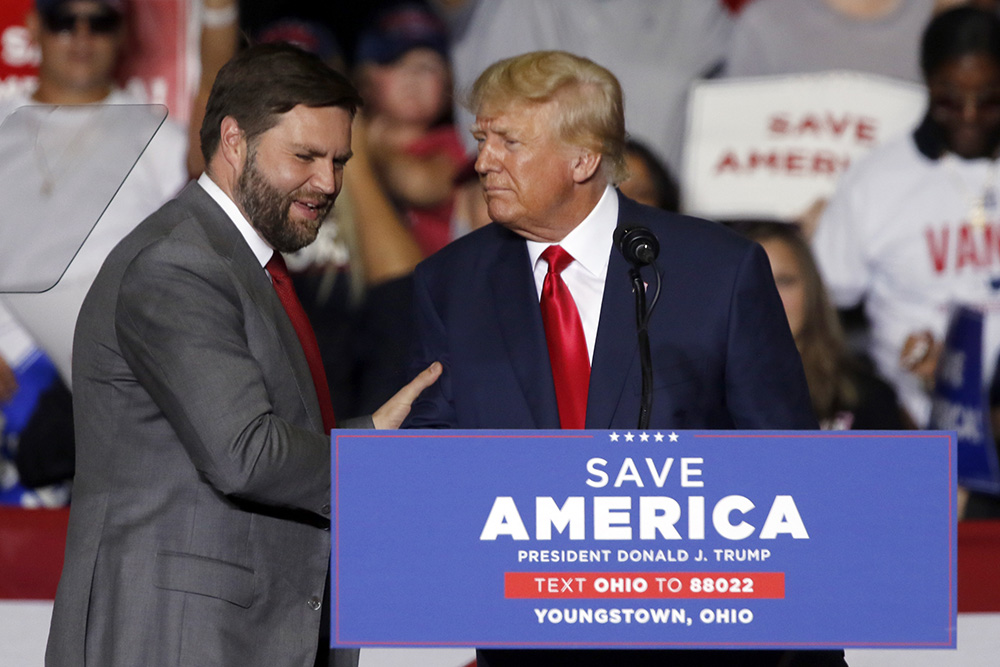
Former President Donald Trump welcomes J.D. Vance, Republican candidate for U.S. senator for Ohio, to the stage at a campaign rally in Youngstown, Ohio, Sept. 17. (AP/Tom E. Puskar)
On the campaign trail, Vance attacks American governing and political institutions, as well as mainstream conservatism, as hopelessly corrupt and hostile to working-class people. Despite his Silicon Valley background, Vance demonizes "Big Tech" firms like Google and Facebook and accuses them of censoring conservative thought.
"One of the biggest threats and biggest assaults to the dignity of the American worker is the fact that so many of our most talented people don't go and build something, whether it's in their own community or a community that really needs it. They go and work on Wall Street or they go and work in Big Tech," Vance said at the Franciscan University conference.
Leaning left, tacking hard right
As that conference highlighted, Vance has aligned himself with the national conservative movement, which leans left on economics by eschewing free trade and unfettered capitalism but tacks to the hard right on social issues while proposing an activist government role to reinforce conservative values and protect national and cultural identity by cracking down on immigration.
In Catholic circles, the movement encompasses "post-liberal" thinkers such as University of Notre Dame political scientist Patrick Deneen and Harvard Law Professor Adrian Vermeule, who are critical of liberal democracy. Both spoke at Franciscan University.
"They are challenging the nature of constitutionalism itself, and their willingness to empower government to do things that are pretty significantly different from what we've seen in the past," Cedarville University's Smith said. "I think Vance reflects some of that. I really do. He seems willing to use the state to pursue a moral agenda."
Advertisement
Vance's candidacy has been bankrolled in large part by billionaire tech investor Peter Thiel, Vance's former boss in Silicon Valley, who donated $15 million to a pro-Vance super-PAC. Thiel has also embraced national conservatism and argued that state power should be used to police universities and Big Tech firms.
Vance has echoed that rhetoric. In a September 2021 podcast interview, Vance encouraged Trump, if he were to return to the White House, to purge millions of federal workers for disloyalty and to defy the courts if challenged.
Vance is "the anti-elite elitist," Bryan Marshall, chairman of the political science department at Miami University in Oxford, Ohio, told NCR.
Marshall said Vance "is not really who he's portraying himself to be, but I don't know if voters will figure that out."
Eager to appeal to Trump's "Make America Great Again" base, Vance has cultivated ties with far-right political figures. He has campaigned with U.S. Rep. Marjorie Taylor Greene, the firebrand freshman congresswoman from Georgia who has described herself as a Christian nationalist. In February, Vance defended Greene when she spoke at a white nationalist conference, saying that she "did nothing wrong."
Vance is a regular guest on Tucker Carlson's Fox News show that often echoes white nationalist talking points. He has appeared on far-right personality and former Trump White House official Steve Bannon's "War Room" podcast, where Vance said in February that he didn't "really care what happens to Ukraine one way or another."

A voter left behind former President Donald Trump's signature Make America Great Again red baseball cap at a J.D. Vance campaign event Oct. 5 in Columbus, Ohio. (NCR photo/Brian Fraga)
In a May 2021 appearance on Bannon's podcast, Vance echoed Trump's unfounded stolen election claims by talking about a need to investigate the results of the 2020 presidential election "as much as possible."
"It seems to me that Vance has decided that the key to his success is a full embrace of Donald Trump and everything Donald Trump stands for," said John Carroll University's Bretzke, who told NCR that Vance, as a politician, comes across to him as "highly transactional."
"He's going to do what he believes is going to be the best for him at this or that given moment," Bretzke said.
Conservative Catholicism, Christian nationalism
For Ryan supporters and some Catholic voters in Ohio, Vance represents a concerning fusion of conservative Catholicism and the kind of Christian nationalism that has gained traction among white evangelicals and Republicans since Trump shook up the conservative establishment in 2016.
"J.D. Vance getting into office seems really terrifying. It feels like we'd be going back in time," said Kellie Kirksey, a psychotherapist in Youngstown. Kirksey, who was born and raised Catholic, spoke about her concerns for the election while visiting a St. Vincent de Paul Society thrift goods sale across the street from St. Patrick Church in Youngstown.
"I have a literal reaction when I even see [Vance], and I trust my gut instinct," Kirksey said. "It's my hope and my prayer that people get out and vote and really know the power of their vote, and just work to make a difference. We have to move forward."
Lisa Johnson, a Cincinnati resident who helps lead a Catholics for Ryan group that aims to mobilize faith-based voters in Ohio, told NCR that she believes "democracy is on the ballot" this Election Day.
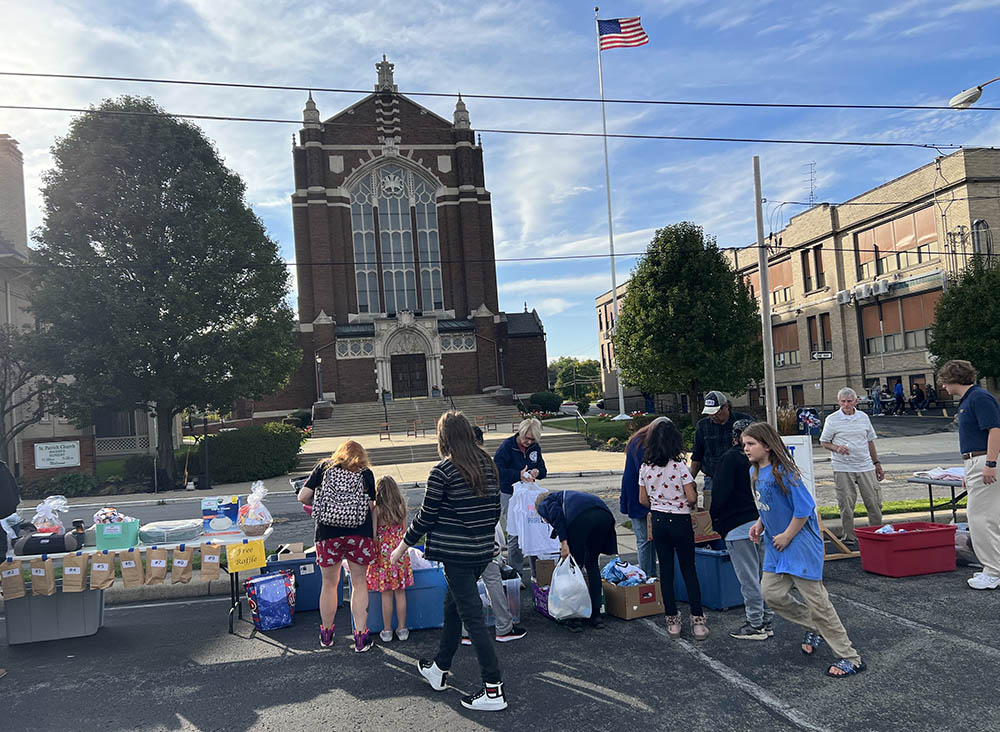
Area residents visit an open-air thrift goods sale across the street from St. Patrick Church in Youngstown, Ohio, on Oct. 6. (NCR photo/Brian Fraga)
"I'm terrified of this Christian nationalism and I'm terrified of losing our democracy," Johnson said. "I think we are creeping towards an autocratic [country]. I'm terrified of the prospect that these people are just going to hold onto power. I think they're fine with democracy dwindling away."
On the campaign trail in Ohio, Vance does not present himself as a champion for Christian nationalism or Catholic integralism, the philosophy espoused by Vermeule, Deneen and University of Dallas political scientist Gladden Pappin, who also spoke at the Franciscan conference. Integralism rejects liberal democracy's separation of church and state.
In his rallies, Vance echoes other Republican candidates across the country who have sought to avoid talking about issues like abortion, Trump's false stolen election claims or the Jan. 6, 2021, assault on the U.S. Capitol.
Instead, Vance emphasizes issues that resonate with Republican voters such as stopping illegal immigration and fighting crime. Vance often accuses his opponent of supporting "open borders" and wanting to "defund the police."
Vance also focuses on economic issues like inflation, high gas prices and the collapse of the Midwest's manufacturing sector.
"We used to make things in this country, and we used to use American hands and American workers to do it. And what a bipartisan set of American leaders did in this country is they decided they could ship our industrial and manufacturing base off to China. Communities like mine would suffer. Families like mine would suffer. The elites would maybe make a few extra pennies, but America and our citizens would not be better off," Vance said during an Oct. 5 campaign stop in Perrysburg, a small city 12 miles southwest of Toledo.
Donald Trump Jr., the former president's oldest child, accompanied Vance that day on the campaign. He sat on a stool and nodded along to Vance's economic populism.
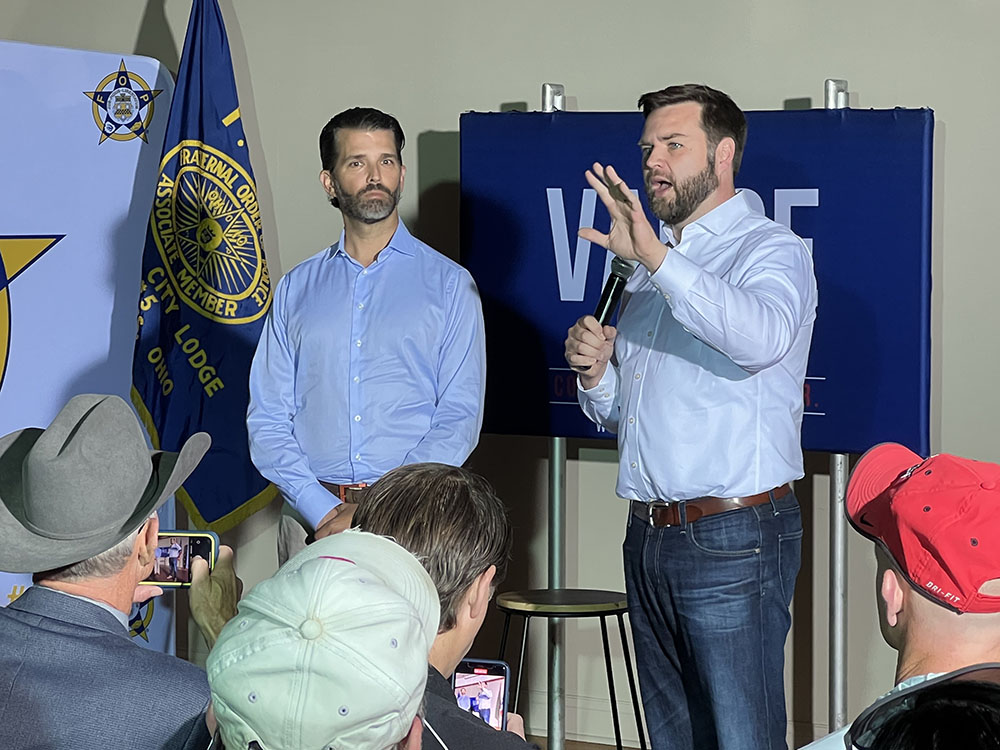
Donald Trump Jr. and U.S. Senate candidate J.D. Vance speak to voters Oct. 5 in Columbus, Ohio. (NCR photo/Brian Fraga)
When he grabbed the microphone, as Vance looked on, Trump aired his family's grievances about the FBI's Aug. 8 search at Mar-a-Lago and claimed Big Tech has "canceled" his father on social media. Trump also mocked President Joe Biden's mental acuity by pretending to walk into a wall, and took potshots at the president's second son, Hunter Biden, a popular target on the right.
"We are fighting for our values. We are fighting for our beliefs," said Trump, whom Vance described as "a pretty close friend" when addressing the Franciscan University audience a few days later.
Since endorsing Vance in the Republican primary, the former president has twice visited Ohio to campaign on his behalf. During a Sept. 17 rally in Youngstown, Trump told the audience that Vance was "kissing my ass" because he wanted the former president's seal of approval.
"The entire MAGA movement is for J.D. Vance," Trump said. In mid-October, Vance said he welcomed the former president's support.
"My argument at the end of the day is whether you like Donald Trump or don't like Donald Trump, there are issues unacceptably going on in this country right now," Vance told reporters after his campaign appearance in Perrysburg.
Vance's embrace of Trump and his far-right connections may alienate progressive and some moderate voters, but not the conservative Ohioans who turned out for his Oct. 5 campaign events in Perrysburg and Columbus. Anthony Pierce, a Freemont resident, wore a red MAGA cap and a T-shirt that presented Trump as Superman while holding a banner that mocked Biden as a Looney Tunes character.
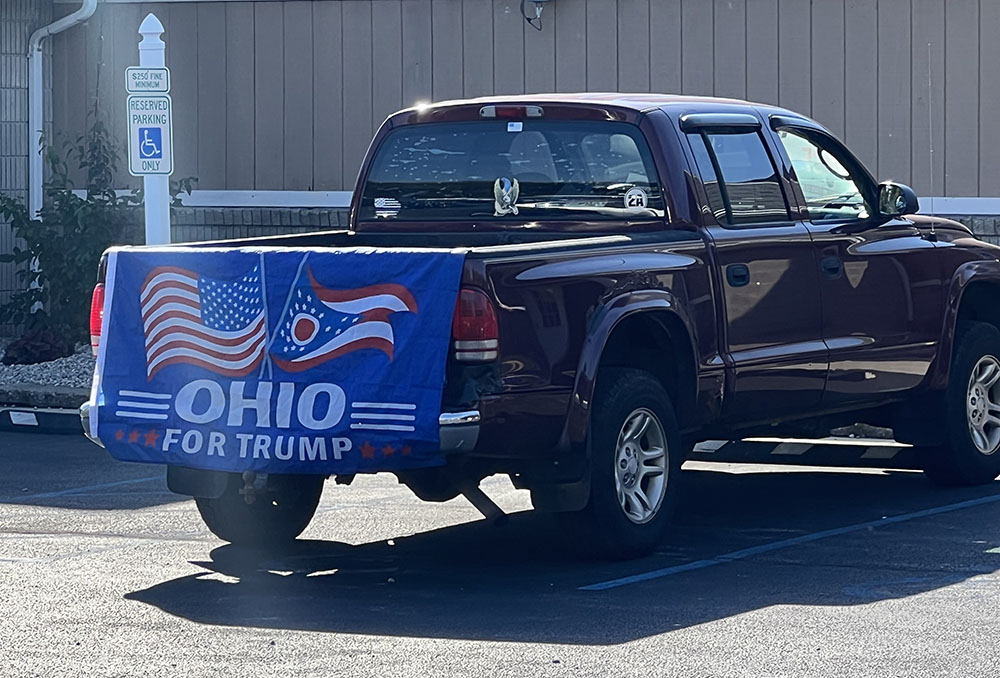
A pickup truck with an "Ohio for Trump" banner parked outside an Oct. 5 campaign event for U.S. Senate candidate J.D. Vance in Perrysburg, Ohio. (NCR photo/Brian Fraga)
Pierce, a self-described Norse Pagan, told NCR that he was initially skeptical of Vance, who before entering Republican politics compared the former president to an opioid addiction and a potential "America's Hitler."
"But after Trump endorsed him, I thought to myself, 'Something must have changed pretty significantly to earn that endorsement. So, let's see what he's about,' " said Pierce, who listed crime, law enforcement and border security as his most important issues. He said his nephew died from a fentanyl overdose.
"If strengthening the border can save people from the loss I've had to deal with, it's worth it," Pierce said.
Shelly Reiser, a stay-at-home mother who lives in Perrysburg, attended Vance's campaign rally with her daughter, whom she pulled from public school three years ago to homeschool "because of all the critical race theory," which she told NCR was being taught at school.
"The more that we take our faith in God out of things, the more that all the evil is going to come in," said Reiser, who was raised Catholic and used to be a Democrat until she said she "found Jesus" nine years ago and "got deeper" in her faith as a nondenominational Christian.
Reiser's departure from the Democrats mirrors political trends in the Midwest and especially Ohio, which for decades was a bellwether for national elections but in recent years has become a reliably conservative "red state" as white working-class voters have flocked to the GOP in droves.
Blaming "elites" for selling out working families and shipping manufacturing jobs to China, Republicans like Trump and Vance preach a populist message that resonates with Ohio voters like Lee Myers, a retired engineer from Perrysburg.
"The economy is the number one issue. We've gotten way off track," Myers told NCR at Vance's campaign event in Perrysburg.

A rundown abandoned house in Steubenville, Ohio (NCR photo/Brian Fraga)
At the same event, Pat Samson, a retired children services counselor from Toledo, flagged Vance down for a selfie before he left for his next event. She later told NCR that she was supporting Vance because "Trump trusts him, and I trust Trump very much."
Marshall, the political scientist at Miami University in Ohio, told NCR that Democrats in recent election cycles have struggled to appeal to white working-class voters, especially those without college degrees.
"Ohio has become a really difficult spot for Democrats, who on one hand are trying to cast a net into the more educated classes, the college-educated classes, while at the same time trying to vie for minority voters and casting the net to get the disaffected white voters," Marshall said.
Roosevelt-style Catholic Democrats
Wary of the elitist label his party has with white working-class voters, Ryan has talked up his own working-class background and Irish-Italian Catholic roots in Niles, Ohio, a small city 8 miles northwest of Youngstown. In his political ads and campaign events, Ryan has cultivated the image of a moderate who is comfortable in rural settings and chatting up voters in Rust Belt communities.
Ryan has distanced himself from Biden, whose approval ratings have been low for most of his term as president. He has disagreed with Biden's student loan forgiveness plan and sided with Trump on trade policy with China.
"I agreed with Trump on trade," Ryan said in a television ad over the summer. "I voted against outsourcing every single time."
Ryan's campaign website — more detailed policy-wise than Vance's — promises to "cut workers in on the deal" and talks up how Ryan has "consistently taken on both parties" on trade policies that have hollowed out Ohio communities by outsourcing jobs overseas.
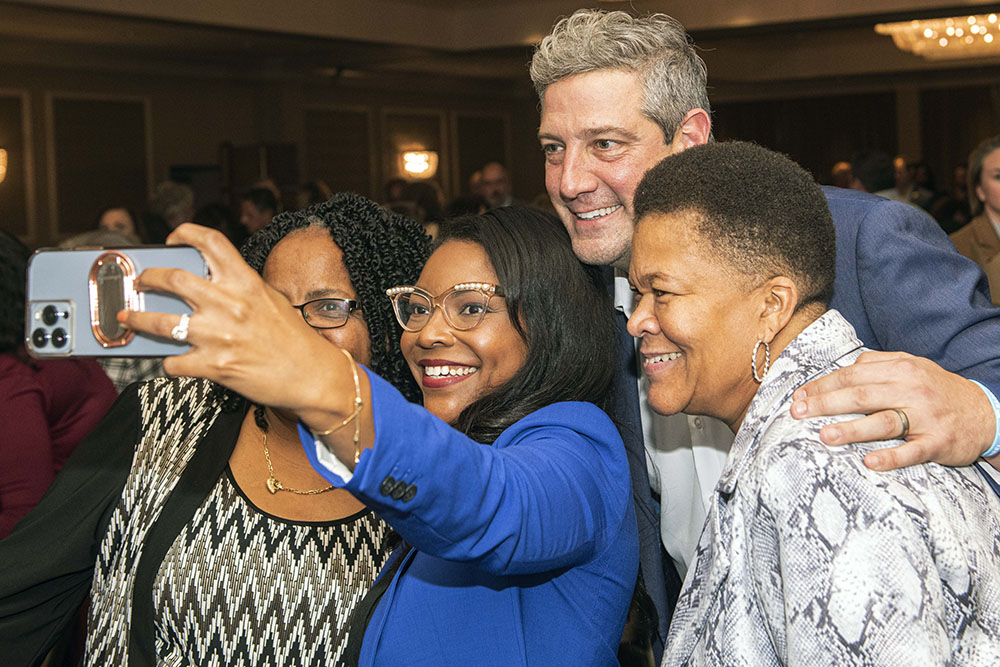
Rep. Tim Ryan, D-Ohio, takes a selfie with Gwen Johnson of Lyndhurst, Ohio (foreground), candidate for U.S. Congress Emilia Sykes of Akron (center), and Margie Chambers of Cleveland after his speech at the Tri-County Labor Council Community Awards Dinner in Fairlawn, Ohio, Oct. 21. (AP/Phil Long)
His campaign also presents Ryan — an ambitious politician who challenged current House Speaker Nancy Pelosi for the House Minority Leader position in 2016 and launched an ill-fated presidential campaign in 2019 — as a bipartisan legislator willing to work across the ideological divide to help working-class communities.
Susan Cleverly, a Cincinnati resident who is also involved in Catholics for Ryan, told NCR that Ryan reminds her of Catholic Democrats like her grandmother who voted for President Franklin D. Roosevelt.
"I see Tim Ryan in that vein," Cleverly said. "He wants to help the working class. He wants to get the middle class back. He wants initiatives to help working people afford a living and afford to support their families."
Vicki Vicars, a community organizer, was registering people to vote in Youngstown on Oct. 6 when she told NCR that she was supporting Ryan because he had grown up in the area, knows its people and had worked hard to advocate for local businesses and nonprofits.
"Nobody is going to be perfect. Nobody's going to do everything that you want. You're not going to make everybody happy, Vicars said. "But I think he's been honest. I think he's been fair."
Vance and other Republicans challenge Ryan's moderate image by referencing political tracking websites like ABC News' FiveThirtyEight that indicate Ryan votes 100% with Biden's legislative agenda. On the campaign trail and in fundraising emails, Vance has called Ryan "a fraud."
Vance told reporters in Columbus on Oct. 5 that Ryan was running as "a diet version of me."
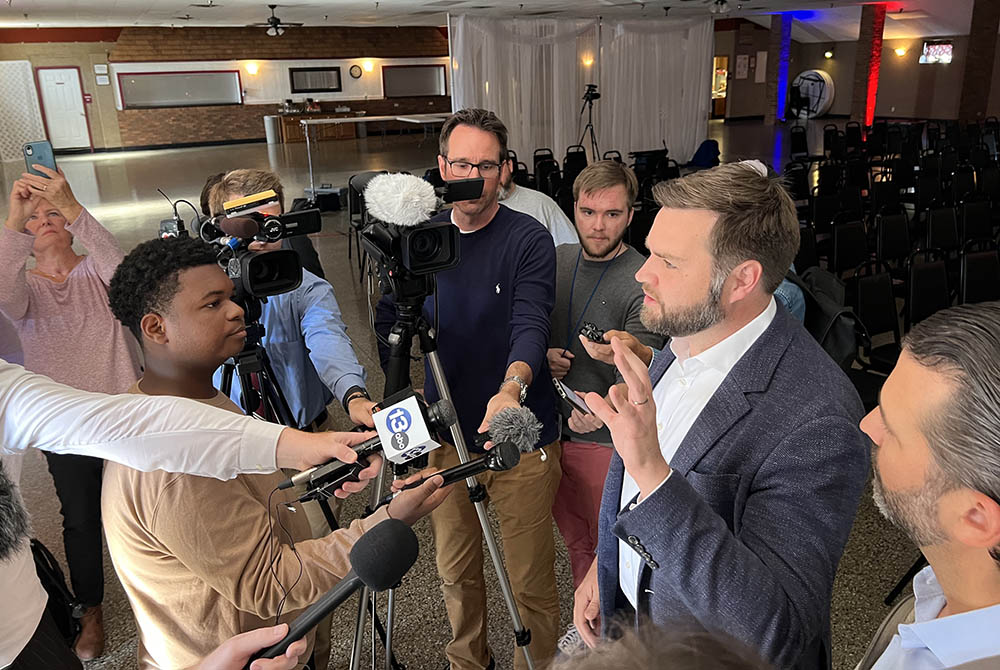
U.S. senate candidate J.D. Vance speaks to reporters Oct 5 in Perrysburg, Ohio, while Donald Trump Jr. looks on. (NCR photo/Brian Fraga)
"You cannot run a campaign that pretends your record doesn't exist," said Vance, who also responded to a question posed by NCR about why he converted to Catholicism in 2019, and how he sees the Catholic faith influencing him as a political candidate.
"A core part of Catholic social teaching is the fundamental dignity of every person — dignity as human beings, as mothers, as fathers, as workers. I try to see that vision enacted in public policy. People have dignity. We should respect that dignity with the policy choices that we make," said Vance, who in a 2019 interview cited St. Augustine of Hippo as a figure who gave him "a way to understand Christian faith in a strongly intellectual way."
During his Oct. 7 virtual rally, Ryan mentioned Campbell, the former executive director of Network who played a key role in mobilizing support for the Affordable Care Act, which was enacted in March 2010.
Ryan credited Campbell and the "Nuns on the Bus" for "shaping the narrative around the health care law." Ryan said that when the House of Representatives passed the bill, he looked up and waved at Campbell and another religious sister in the gallery, whom he had invited to watch the final vote.
"'When I'm in the foxhole, if I know we have the nuns on our side," Ryan said, "I know we're in the right spot."




